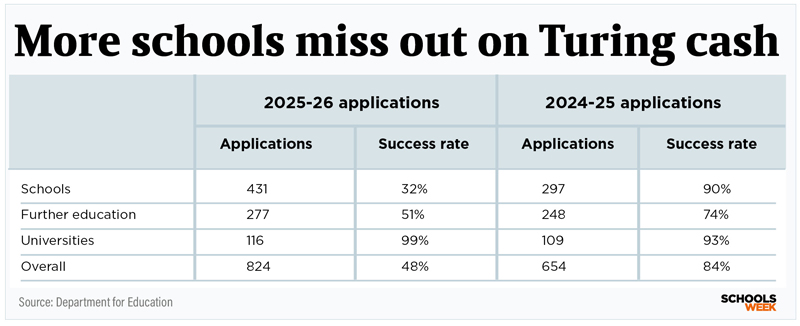Two thirds of schools bidding for cash to send children on life-changing trips overseas were snubbed, sparking fears poorer youngsters are being sidelined from the Turing Scheme.
Union bosses are urging the government to put an end to schools “receiving comparatively lower funding” through the programme than its predecessor, and support them “in closing the disadvantage gap”.
And despite the programme receiving a record number of school applications, leaders revealed they shunned the scheme amid concerns over the burdensome application process and not being able to take all children on the trips.
‘Appetite from schools’
Association of School and College Leaders general secretary Pepe Di’Iasio said: “There is appetite from schools and sixth forms to engage in the programme, but not the commitment from government to support them.

“At a time when language entries are under threat, the opportunity to study abroad from an early age should be celebrated and encouraged. This data suggests it isn’t so.”
The flagship post-Brexit scheme, named after scientist Alan Turing, was launched five years ago to replace the EU’s Erasmus+ programme, with a new focus on social mobility.
The then education secretary Gavin Williamson also allowed trips backed by the programme to be made outside the EU.
This year, it was scaled back by almost £30 million, with the £64 million total funding available representing a four-year low.
Department for Education data shows just 32 per cent (140) of school applications to the Turing Scheme this year were successful, down from 90 per cent 12 months ago.
This compares to 99 per cent (115) for universities and 51 per cent (140) for further education institutions.
‘Alarming’ drop
Schools also sent the fewest youngsters on Turing placements (5,071) and received the least funding through the programme (£7 million). Despite this, they handed the highest proportion of placements to disadvantaged children (82 per cent).
Di’Iasio added that “in comparison to Erasmus+, the schools sector now appears to be receiving comparatively lower funding”. ASCL “would like this to change, and for the government to offer greater support for schools in closing the disadvantage gap”.

Ian Birbeck, of Projects Abroad, which advises leaders on applications, branded the drop in schools’ success rate “alarming”. He warned this could leave leaders lacking “the confidence to dedicate resources to the application process”.
Bosses of the Bellevue Place Education Trust in London decided against re-applying for the funding following a successful bid in 2023-24.
CEO Mark Greatrex said it was agreed they “couldn’t go through that all of the time”. One of the MAT’s heads spent his easter break drawing up the bid and other members of staff had to help secure pupil passports.
Record applications
Durham and Newcastle Diocesan Learning Trust CEO Paul Rickeard stated his 21-school chain has “never engaged with Turing because of the fear of not being able to involve all children”. His “primary concern is the unintended consequence of a dual offer”.
Birbeck said there is also “a perceived lack of transparency around why projects are rejected”. This, along with a “low overall awareness of the scheme, must be urgently addressed”.
The DfE stressed it wants to ensure “providers have the funding they need to deliver the placements they applied for”. This meant that this year “we decided to fund successful school and FE applications in full”, up to a limit of £300,000 for a group of schools.
Previously the department stretched the cash “across many providers”, which risked “not being able to deliver their intended placements”.
It also said a “record number of applications from schools” were received this year.
Turing’s future
Greatrex noted his 11-school trust originally wanted to send all its “year six children on a cultural enrichment trip to Florence”.
But after only receiving “part of the funding” applied for, Bellevue’s plans had to be scaled down to four schools “that serve our most deprived areas” based on free school meals numbers.
“Ironically, the person who wrote the application, his school wasn’t selected. It was a shame,” Greatrex continued.
No funding has been announced to continue the Turing Scheme next year. In May, skills minister Jacqui Smith said the government had begun negotiating to “work towards” rejoining Erasmus+.
The DfE said this would be “on much better financial terms for the UK”. Details on the “Turing Scheme for future years will be shared in due course”.







Your thoughts